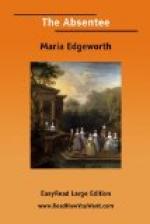’Oh, Grace, if you knew how much I felt when I said that, you would spare this raillery.’
’I will be serious—I am most seriously convinced of the sincerity of your affection for me; I know my happiness is your object in all you have said, and I thank you from my heart for the interest you take about me. But really and truly, I do not wish to marry. This is not a mere commonplace speech; but I have not yet seen any man I could love. I like you, cousin Colambre, better than Mr. Salisbury—I would rather live with you than with him; you know that is a certain proof that I am not likely to be in love with him. I am happy as I am, especially now we are all going to dear Ireland, home, to live together: you cannot conceive with what pleasure I look forward to that.’
Lord Colambre was not vain; but love quickly sees love where it exists, or foresees the probability, the possibility of its existence. He saw that Miss Nugent might love him tenderly, passionately; but that duty, habit, the prepossession that it was impossible she could marry her cousin Colambre—a prepossession instilled into her by his mother—had absolutely prevented her from ever yet thinking of him as a lover. He saw the hazard for her, he felt the danger for himself. Never had she appeared to him so attractive as at this moment, when he felt the hope that he could obtain return of love.
’But St. Omar!—Why! why is she a St, Omar!—illegitimate!—“No St. Omar Sans REPROCHE.” My wife she cannot be—I will not engage her affections.’
Swift as thoughts in moments of strong feeling pass in the mind without being put into words, our hero thought all this, and determined, cost what it would, to act honourably.
’You spoke of my returning to Ireland, my dear Grace. I have not yet told you my plans.’
‘Plans! are not you returning with us?’ said she, precipitately; ’are not you going to Ireland—home—with us?’
’No—I am going to serve a campaign or two abroad. I think every young man in these times—’
‘Good heavens! What does this mean? What can you mean?’ cried she, fixing her eyes upon his, as if she would read his very soul. ’Why? what reason?—Oh, tell me the truth and at once.’
His change of colour—his hand that trembled, and withdrew from hers—the expression of his eyes as they met hers—revealed the truth to her at once. As it flashed across her mind, she started back; her face grew crimson, and, in the same instant, pale as death.
‘Yes—you see, you feel the truth now,’ said Lord Colambre. ’You see, you feel, that I love you—passionately.’
‘Oh, let me not hear it!’ said she; ’I must not—ought not. Never, till this moment, did such a thought cross my mind—I thought it impossible—oh, make me think so still.’
‘I will—it is impossible that we can ever be united.’
‘I always thought so,’ said she, taking breath with a deep sigh. ’Then why not live as we have lived?’




